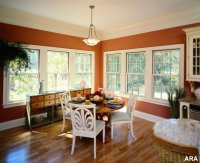 (ARA) – We live in a world where convenience is a high priority regardless of its cost. According to the U.S. Green Building Council, on average each home in the United States consumes about 11,000 KwH of electricity a year. The monetary cost for homeowners is roughly $900.
(ARA) – We live in a world where convenience is a high priority regardless of its cost. According to the U.S. Green Building Council, on average each home in the United States consumes about 11,000 KwH of electricity a year. The monetary cost for homeowners is roughly $900.
As they consume electricity, each home in the country contributes to the depletion of the ozone layer and the supply of non-renewable fossil fuels. Did you know that the electricity generated from fossil fuels for a single home puts as much carbon dioxide into the air as two automobiles? The unforeseen cost to our environment is not only immeasurable but also irreversible.
Updating windows and replacing old appliances are just a few ways to make a home more energy efficient, therefore lessening pollution. Updating single pane windows to Energy Star-qualified insulating windows can reduce a home’s harmful impact and save homeowners as much as $400 per year on energy bills.
Environmental consciousness at home is manageable through a variety of other techniques as well, including using recycled materials when building or remodeling a home, installing high efficiency appliances such as tankless water heaters, and minimizing water usage through flow restrictors and other means.
‘Many homeowners are misled to believe that the cost of environmentally friendly building products outweighs the overall gain,’ says Jeff Kibler of Peachtree Doors & Windows. ‘The truth is, technologically advanced materials significantly reduce the burden on the environment and save on monthly bills. You really cannot ask for a better solution in home building.’
According to a report by the U.S. Green Building Council completed in 2003, a minimal increase in upfront costs of 0 to 2 percent to support green building design will result in life-cycle savings of 20 percent of total construction costs — more than 10 times the initial investment.
New technology in the window and door industry has furthered energy efficiency by reducing a home’s harmful impact on the environment. The most recent advancement includes the introduction of highly energy efficient glass, Zo-e-shield. By reducing the amount of heat gained or lost through a home’s windows, it successfully reduces strain on the environment and dependence on dwindling fossil fuels. Peachtree Doors & Windows is just one manufacturer offering these glazing systems.
Energy efficiency of a window is determined by a number of measurements such as U-value and solar heat gain. The U-value of a window represents the amount of heat escaping from a home within an hour’s time. The lower the U-value, the better insulated a home remains and less energy used to heat it during winter months, which is particularly crucial in the North. Solar heat gain coefficient (SHGC) measures how well a window or door blocks the heat generated from sunlight. The lower the value, the less solar heat that penetrates the unit. Solar heat gain is more applicable to the South because a window reporting lower solar heat gain coefficients minimizes solar heat penetration, thus reducing home cooling costs.
For example, Zo-e-shield glazing systems report U-values between .24 to.19 and a SHGC from .27 to .25 — the lowest available. Zo-e-shield provides up to a 60 percent and 68 percent improvement respectively, over the U-value and solar heat gain coefficient of clear insulated glass.
‘Homeowners are becoming more aware of product performance,’ Kibler says. ‘It is important for them to understand the many benefits energy efficient windows and doors can provide.’
According to the U.S. Department of Energy, U.S. homes collectively consume up to 3.8 quadrillion BTUs of energy annually in the form of heating and air conditioning expenses. At a cost of more than $30 billion to homeowners, it pays to compare glazing options when choosing windows for your home. Zo-e-shield glazing systems incorporate advanced components used in glazing systems currently offered by window manufacturers that have saved homeowners more than an estimated $8 billion in energy costs, according to Peachtree. Zo-e-shield builds on these advanced components to extend energy efficiency even further.
For years people have been discussing the need to protect our environment and suggested countless ideas for doing so. Taking an active role in preserving the future of the environment is simple and beneficial. Products and practices that manage home energy efficiency do not compromise home comfort but rather enhance a home while protecting the environment. To find more practical tips on how to make your home more energy efficient, visit www.energystar.gov. For more information on Zo-e-shield, call Peachtree at (800) 732-2499.
Courtesy of ARA Content
Sponsored by Peter M. Galde who is the founder and principal at Cornerstone Capital Funding, 14520 Mono Way, Suite 110, Sonora Ca. 95370. Peter has 28 years experience in the finance industry. E mail Peter or call him on 209 532 7711 for further information.
